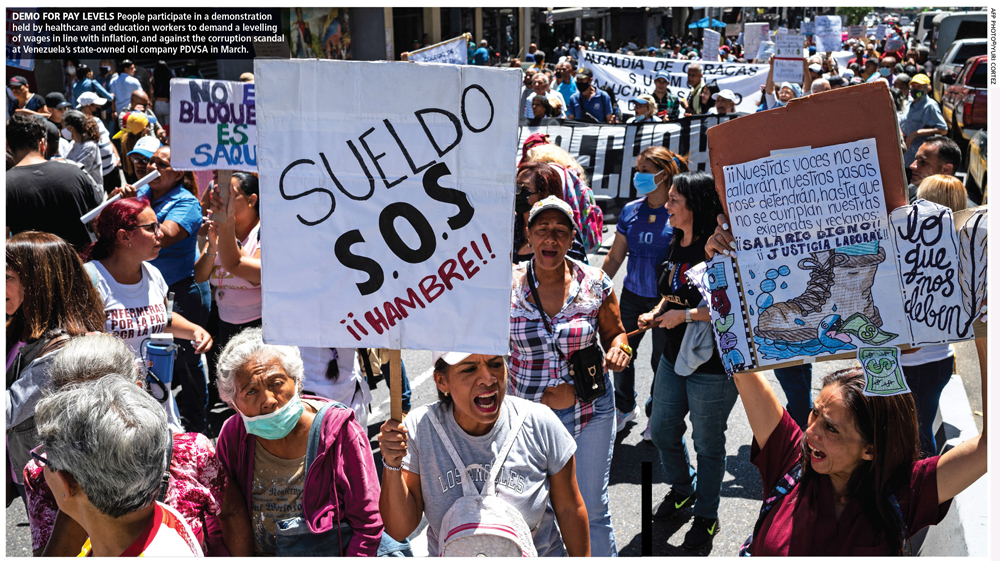FLEEING FROM A LIVING HELL
Rajika Jayatilake asserts that economic mismanagement and corruption have made life a living hell in Venezuela

Of Venezuela’s recorded population of 28.8 million last year, 7.7 million people had left the country by August. They’re fleeing willingly and taking on dangerous journeys by way of hazardous sea voyages to the Caribbean islands or treks across unsafe terrain to other Latin American countries.
Most have no travel documents, and they fall prey to ruthless smugglers and human traffickers. This phenomenon has become one of the world’s most telling displacement crises.
Until some10 years ago ironically, Venezuela was one of Latin America’s wealthiest nations with a thriving middle class, a sturdy public healthcare system and recognised colleges.
Its wealth lay in the world’s largest oil reserves, which were estimated to be 300 billion barrels in 2021. The reserves comprise mostly extraheavy crude oil from the Orinoco Belt that runs through central Venezuela but is a challenge to produce.
Venezuela’s invitation to international oil companies resulted in investments of billions of dollars through the transfer of technology and construction of infrastructure to convert the extra-heavy crude oil into exports.
And the country began to prosper…
However, economic mismanagement of the oil industry, a lack of economic diversity, driving away international expertise from the country and failing to reinvest funds in the capital intensive oil industry led to a steep decline in Venezuela’s oil production.
In fact, production in 2018 was around 50 percent less than in 2006.
The economic fallout was exacerbated by formidable sanctions imposed by the US and widespread corruption – especially in the country’s politicised justice system. And the bleak economic situation galloped to a staggering 6,500 percent inflation in 2021, leading some stores and restaurants to weigh banknotes handed by customers when paying for goods rather than considering their face value.
The total worthlessness of the Venezuelan currency was captured by the price of a single cup of coffee at 1.55 million bolivars.
Venezuelans suffered in silence for many years by scraping the bottom of the barrel of their earnings, barely assuaging their children’s hunger with the little food that was available and grieving for family members who were dying from preventable illnesses due to the lack of medication while waiting in impossibly long lines for gasoline to reach markets or hospitals.
The fallout from this situation affected children the worst as they’re among the most vulnerable, and at greater risk of hunger and starvation.
So it’s no surprise that Venezuelans are fleeing their homes in droves.
As British writer Warsan Shire says: “No one puts their children in a boat unless the water is safer than the land.”
An alarming trend has emerged with the number of children engaged in dangerous journeys increasing over time. According to UNICEF, in the months of January and February last year, almost 9,700 children (that’s seven times more than in 2022) joined the arduous trek through the Darién Gap – which is the roadless jungle area connecting Colombia and Panama – where migrants are often robbed, raped or killed.
Most Venezuelans seek refuge in neighbouring countries such as Brazil, Colombia, Ecuador and Peru, placing an unrelenting strain on social services close to the borders.
Many move from one country to another for years, seeking stability and finding little comfort. Most prefer to remain in Latin America and the Caribbean with Colombia providing shelter to 2.5 million refugees. Some are also risking their lives to get to Chile, which is one of the richest countries in South America.
Emerging from the shadows of eight years of economic disaster, Venezuela finally saw a glimmer of recovery when the government of President Nicolás Maduro relaxed currency controls in 2019.
Imported food and new restaurants began thriving, and life got better for the elite. However, life was still bleak for ordinary people with shortages of power and pipe borne water, political instability and a crushing 234 percent rate of inflation in 2022.
Yet, many Venezuelans discovered the bitter truth that the grass is not always greener on the other side. About 300,000 of them returned home with 30,000 assisted by a repatriation programme called ‘Return to the Motherland.’ They admit that returning to Venezuela was the best option for them.
However, the IMF claims that over six million Venezuelans who settled in other Latin American countries have brought economic opportunities to those nations through speedy integration into their formal labour forces.
Moreover, the general opinion among Venezuelans is that the only chance for fundamental change in the country is to sweep out the current autocratic government responsible for the economic catastrophe. They are looking forward to a presidential election next year.
The Venezuelan situation is not totally hopeless as Maduro’s government is set to ink an agreement with the US to lift some of the sanctions, provided the Venezuelan regime allows a fair election in 2024.
As Russian writer Leo Tolstoy wisely said, “true life is lived when tiny changes occur.”





